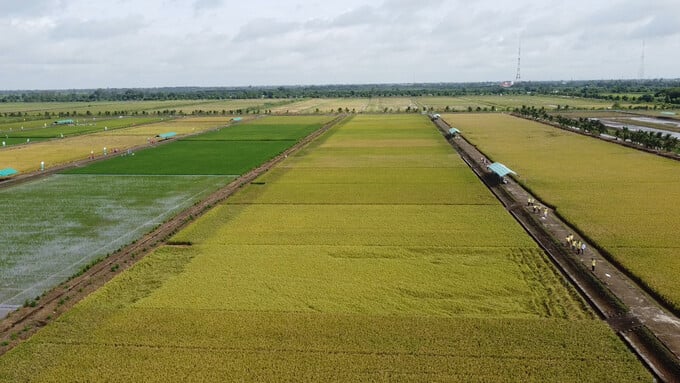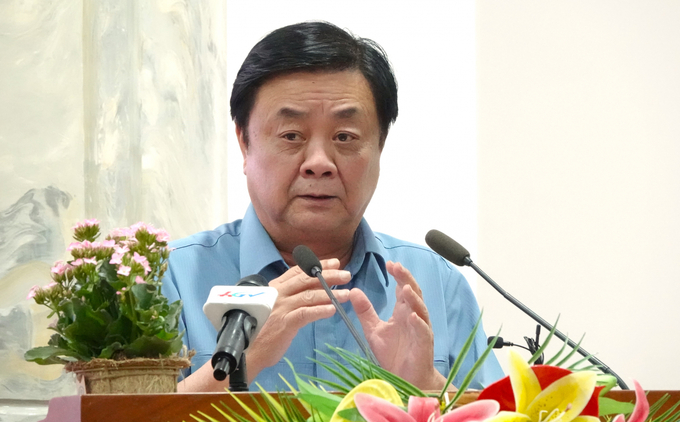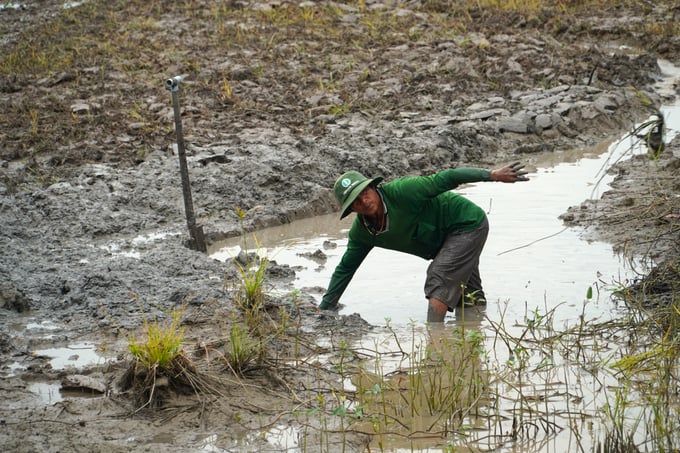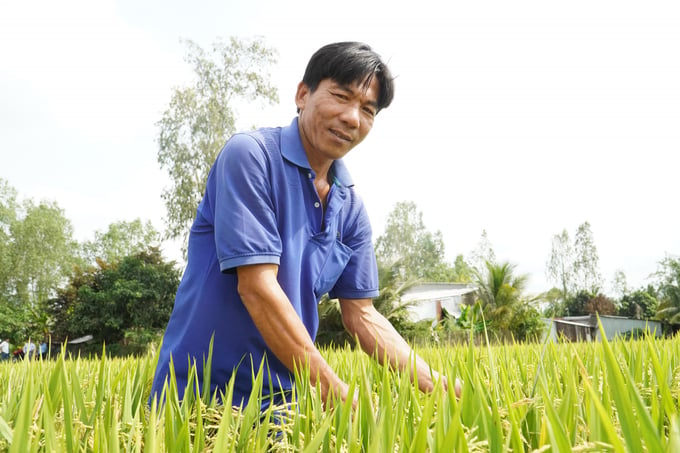November 24, 2025 | 08:17 GMT +7
November 24, 2025 | 08:17 GMT +7
Hotline: 0913.378.918
November 24, 2025 | 08:17 GMT +7
Hotline: 0913.378.918
In 2021 at the UN Food Systems Summit, Vietnam made a commitment to transform the food system towards transparency, responsibility and sustainability, aspiring to become a global food powerhouse. Also at the UN COP26 in Glasglow, Prime Minister Pham Minh Chinh made a commitment in front of world leaders to reduce methane emissions by 30% by 2030 and reach net zero emissions by 2050.
In order to realize these commitments, the Government of Vietnam has launched the Program to support the implementation of the National Contribution Report to self-determine the Nationally Determined Contributions (NDCs), mobilizing domestic and foreign resources to support the implementation of Vietnam's commitments to reducing greenhouse gas emissions, promoting green growth, and adapting to climate change. In particular, the Ministry of Agriculture and Rural Development, the business community and rice farmers in the Mekong Delta have great hope for the “Scheme of Sustainable Development of 1 million ha specializing in high-quality rice cultivation associated with green growth in the Mekong Delta”.

The “Scheme of Sustainable Development of 1 million ha specializing in high-quality rice cultivation associated with green growth in the Mekong Delta” will completely transform the rice industry of the Mekong Delta in particular and Vietnam in general. Photo: Kim Anh.
“For the first time in Vietnam, the concept of green, circular, low-emissions economy is integrated into a project with many new approaches. This project not only helps the rice industry in the Mekong Delta to create economic value through the sale of carbon credits, but also impacts many social, income and structural issues of rural communities. The most important part is the change in farming mindset in adaptation to the trend of green economy and responsible consumption. New agricultural thinking as well as the state - business - society development triangle will be shaped through the Scheme of 1 million ha of high-quality rice,” Minister of Agriculture and Rural Development Le Minh Hoan said.

"For the first time in Vietnam, the concept of green, circular, low-emissions economy is integrated into a project with many new approaches," said Minister Le Minh Hoan. Photo: Van Vu.
The leader of Vietnam’s agriculture sector also believes that the Mekong Delta has the right to hope for a brighter future of the rice industry. Consumers worldwide will know about the slogan “Think rice, think Mekong Delta”. Vietnam is marching towards a big change in rice production and business mindset, starting to become a pioneer in low-emissions rice production, and the Scheme of 1 million ha of high-quality rice shall mark its first step.
Over the past few years, the Mekong Delta has received a lot of support from international organizations to implement eco-friendly rice farming models. According to calculations by the World Bank (WB), the cost of converting to a low-carbon rice farming model is quite high. A survey conducted by WB in Vietnam shows that Vietnam needs to invest USD 515 - 3,890 per ha of rice to achieve an average or zero emission reduction rate.

The longer it takes to switch to low-carbon rice production, the higher the cost will be. Photo: Van Vu.
Most recently, in the consultation workshop of international organizations concerning the construction of the Scheme of 1 million ha of high-quality rice, the financial support from WB attracts the most attention. Mr. Cao Thang Binh, a senior expert of the World Bank in Vietnam, pledged to build a non-refundable aid project with an estimated grant of USD 20 million, which will help Vietnamese banks implement credit programs for farmers.
During the 2023 – 2024 period, the World Bank plans to mobilize USD 40 million non-refundable from the Carbon Credit Payment Fund and the climate financial market to launch the next project of VnSAT to support activities related to carbon credits. WB will consider putting this program on the list of priorities to implement together with the Scheme of 1 million ha specializing in high-quality rice cultivation.
Next, in the 2025 - 2026 period, WB can raise an additional USD 60 million from the above funds to serve the goal of developing a carbon market in Vietnam. The organization expects to continue to finance USD 300 - 400 million for the Mekong Delta region, aiming to achieve the goal of sustainable development of 1 million ha specializing in high-quality rice cultivation associated with green growth in the near future.

Over the past few years, the Mekong Delta has received a lot of support from international organizations to implement eco-friendly rice farming models. Photo: Kim Anh.
Mr. James Deane, Representative of the Australian Embassy in Vietnam, informed that Australia currently has a budget of approximately AUD 232 million to cooperate with the countries of the Mekong sub-region, especially in areas related to climate change adaptation.
Particularly for Vietnam, in the 2022 - 2027 period, through the Project “Transforming the rice value chain for climate resilient and sustainable development in the Mekong Delta”, the Australian Government will spend AUD 15 million to support the rice industry in An Giang, Kien Giang and Dong Thap in developing green agriculture and reducing greenhouse gas emissions.
The fourth Global Conference of the Sustainable Food Systems Programme is scheduled to be held from April 24 to 28 in Hanoi. The event receives attention from many ministers, deputy ministers, and heads of sectors from countries and international organizations.
The 4th global conference of the Sustainable Food Systems Programme will contribute to the 2023 Stocktaking Moment of the UN Food Systems Summit follow-up process by focusing on how food systems need to be transformed to overcome the multiple deeply rooted and interlinked crises of climate, biodiversity, conflict, energy, prices, hunger, malnutrition, and health to achieve the sustainable development goals (SDGs).
As the host country of the fourth conference, Vietnam will have the opportunity to share with other countries, United Nations organizations and international organizations about the efforts, results and the process of Vietnam's food system transformation.
The opening session is scheduled to be held on the morning of April 24, followed by thematic sessions. The SFS Program's closing meeting and the Multi-Stakeholder Advisory Committee (MAC) are scheduled to be held on the afternoon of April 27 and the morning of April 28.
For more information, please visit the links below:
https://www.oneplanetnetwork.org/programmes/sustainable-food-systems/4thconference
https://nongnghiepmoitruong.vn/hoi-nghi-toan-cau-he-thong-lttp-channel46/
Translated by Samuel Pham

(VAN) The agricultural sector is finalizing the strategic framework for emission reduction, setting the goal of sharply cutting methane and 403.7 million tons of CO2 equivalent and moving toward Net Zero by 2050.
/2025/11/22/2236-1-153832_483.jpg)
(VAN) The National Marine Spatial Planning is opening up opportunities for sustainable blue sea development across 21 coastal localities.

(VAN) Viet Nam’s forestry sector is undergoing a comprehensive transformation, strengthening management, protection, and development efforts to maintain ecological security and drive green, sustainable growth.

(VAN) Viet Nam is accelerating efforts to digitize reservoir operations, from real-time data to hydraulic modelling.
/2025/11/21/3348-2-102623_454.jpg)
(VAN) National Assembly delegate Nguyen Thi Lan has proposed adding special mechanisms to attract human resources to the agricultural, forestry, and fishery sectors, addressing the shortage of high-quality personnel.

(VAN) Over the past two decades, the unified legal framework for water resource management has been perfected, becoming a crucial foundation for ensuring national water security.

(VAN) The land-data cleansing campaign in Dien Bien is entering its final stretch, yet weak infrastructure, limited personnel and fragmented multi-period datasets continue to create major obstacles.